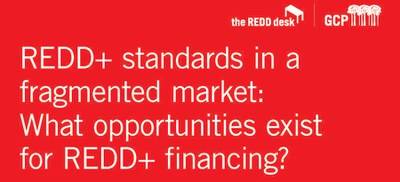REDD+ Standards event at Warsaw COP

The event, titled “REDD+ standards in a fragmented market: what opportunities exist for REDD+ financing?” was attended by a variety of participants to the COP, including representatives of the public and private sector. It helped bring clarity to the complex landscape of REDD+ standards and highlighted opportunities for scaling up demand. Louisa Denier, Project Manager of GCP’s REDD Desk, opened the panel and it was moderated by Charlotte Streck, Director of Climate Focus. The speakers included Leslie Durschinger, Founder and Managing Director of Terra Global Capital (also an FCMC core partner); David Antonioli, Chief Executive Officer of the Verified Carbon Standard; and Kate Dillon Levin, Corporate Engagement and Membership at Code REDD.
The event followed the launch of the Markets and Standards platform on GCP’s REDD desk, which was developed with FCMC’s financial and technical support. It provides up-to-date comparative information and analysis on standards, methodologies and guidance for REDD+, bringing clarity to this complex landscape. The platform currently includes information on 15 standards and allows users to compare how each of those standards deals with 12 key REDD+ design features such as additionality, leakage and permanence.
“REDD+ standards in a fragmented market: what opportunities exist for REDD+ financing?” aimed to explore the role of the variety of active and emerging REDD+ standards in light of the current and anticipated market for REDD+ credits, and debate how to stimulate demand for REDD+. This topic is important because of the significant gap that exists between supply and demand of REDD+ credits. To drive and absorb increased supply of REDD+ credits prior to an anticipated market under a future global climate agreement, the market must provide a strong signal that there is demand for REDD+. The event underlined that an important component of this is increasing investor confidence and private sector demand for REDD+. The role of standards as the REDD+ market landscape changes was also discussed. As countries advance in their readiness efforts, it is important to consider the role of emerging standards and methodologies in incorporating existing subnational projects into jurisdictional or national programmes.

